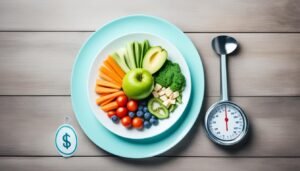Vegetarianism started a long time ago, in the sixth century B.C. It’s getting more popular now. A vegetarian diet means eating more plant-based foods and less from animals.
It brings lots of health perks. That includes less chance of heart disease, diabetes, and other issues. Going for a thoughtful vegetarian diet helps with weight loss.
Key Takeaways
- The vegetarian diet emphasizes plant-based nutrition, making it a popular choice for weight loss.
- Vegetarian diets are linked to a lower risk of chronic diseases such as heart disease and diabetes.
- Studies show that following a well-planned vegetarian diet can lead to greater weight loss compared to non-vegetarian diets.
- High-fiber, nutrient-dense plant-based foods are the key to successful weight loss on a vegetarian diet.
- Proper meal planning and balancing macronutrients are essential for maintaining satiety and achieving long-term weight management on a vegetarian diet.
Understanding the Vegetarian Diet
The vegetarian diet means not eating meat, fish, or chicken. Some types let you have dairy, eggs, and veggies. This plant-based diet is about eating fruits, veggies, whole grains, nuts, and seeds.
Types of Vegetarian Diets
There are many types of vegetarian eating.
- Lacto-vegetarian – Includes dairy but not eggs or meat.
- Ovo-vegetarian – Includes eggs but not dairy, meat, or fish.
- Lacto-ovo vegetarian – Eats dairy and eggs, not meat or fish.
- Pescatarian – Eats fish, no meat or chicken.
- Vegan – Eats no animal products, not even dairy or eggs.
Benefits of a Plant-Based Diet
A well-planned vegetarian diet is good for you. It can lower heart disease, some cancers, diabetes, and high blood pressure. Eating lots of whole foods can help with weight and keep you healthy.
| Potential Benefits of a Vegetarian Diet | Supporting Evidence |
|---|---|
| Reduced risk of heart disease | Research suggests that following a plant-based diet can reduce the risk of cardiovascular disease and coronary heart disease by 40 percent. |
| Lower risk of certain cancers | Vegetarian diets have been associated with a decreased risk of certain types of cancer, such as colon and breast cancer. |
| Improved management of diabetes | A vegetarian diet has been shown to be effective in managing and potentially reversing type 2 diabetes. |
| Decreased blood pressure | Vegetarians generally have lower blood pressure levels compared to non-vegetarians. |
Does the Vegetarian Diet Work for Weight Loss?
The vegetarian diet is great for weight loss. You should focus on lots of veggies, fruits, and nuts. Plant-based protein like beans and soy can help you feel full. This makes it easier to eat less and lose weight.
Calorie Deficit and Nutrient-Dense Foods
Many studies show that vegetarian diets help you lose weight. Eating enough protein can make you feel full. This might make you eat fewer calories and lose weight.
But, eating too many refined carbs can make you gain weight. They might cause your body to store more fat. This can increase your BMI.
Plant-Based Protein and Weight Management
Vegetarian meals often have healthy fats. These come from nuts, seeds, and avocados. They are good for you, but high in calories.
It’s important to focus on non-starchy veggies and protein. Eating less processed foods and watching your portions can help you lose weight. Try to eat mostly whole foods. This helps keep off extra weight. Limiting highly processed foods is also key.
How Does the Vegetarian Diet Impact Hunger?
Going vegetarian might make you lose weight. But, you might feel more hungry. That’s because these foods have fewer calories. You need to eat more to get full. It’s important to pick fiber-rich whole foods and have well-balanced vegetarian meals. Make sure to include many nutrient-dense things in your meals.
Satiety from Fiber-Rich Foods
A vegetarian diet is rich in foods with fiber. Think fruits, veggies, whole grains, beans, nuts, and seeds. These foods help you feel full. They also can aid in weight loss. The fiber makes your body digest food slowly. So, you stay full for a longer time.
Meal Planning for Proper Nutrition
For a balanced vegetarian diet, meal planning is key. Use many nutrient-dense foods like leafy greens, beans, and grains. Include nuts and seeds too. This mix meets your nutritional needs. It also helps you feel full. This supports your weight loss journey.
Weight Loss Potential on the Vegetarian Diet
Studies show a well-planned vegetarian diet helps with weight loss. People on this diet lost more weight than others. They lost about 4.4 pounds more in almost 4 months. This happened because they ate lots of whole grains, fruits, and vegetables. These foods are full of fiber. They help people to weigh less.
Some research points out that a vegan diet might be best for weight and health. It works well for those with type 2 diabetes. A vegetarian diet helps control blood sugar and heart health. A study in 2007 showed big changes in weight with a vegan diet.
Foods in a vegetarian diet are usually high in fiber and nutrients. These help a lot with losing weight. Eating a lot of whole grains, fruits, and veggies makes a big difference. It can lead to more weight loss than other diets.
Comparing Vegetarian Diet to Other Weight Loss Diets
Vegetarian diets seem to help with weight loss against a non-vegetarian diet. But we need more studies to say how well they do compared to other diets. One study showed people on a vegetarian diet stuck with it longer than those on a weight-loss diet. Most in the vegetarian group stayed with it for more than a year.
Sustainability and Long-Term Adherence
Sticking with a vegetarian diet for a long time might be easier than with other diets. It seems to work well for losing weight, especially when compared to non-vegetarian diets. Eating lots of whole grains, fruits, and veggies might be why vegetarians do so well with weight loss.
A study also found that more people stayed on a vegetarian diet for over a year. In comparison, those on different diets only lasted one to three months. This hints that a vegetarian diet could be easier to stick with in the long run.
vegetarian diet weight loss
Eating vegetarian can help you lose weight. But, it has some challenges too. You might eat too much, not get enough protein, eat lots of bad carbs, and focus on processed foods.
Barriers to Losing Weight on a Vegetarian Diet
Eating big portions of high-calorie foods is a challenge. Things like nuts and avocados can be too easy to overdo. For many, getting enough protein is not a concern. But, it’s key for staying full and burning fat. Foods high in refined carbs, like bread, may add too many calories. This makes it hard to lose weight.
Also, focusing on fake meats can be bad. They’re high in calories, fat, and salt. Too many fats from plants can also prevent weight loss if not eaten right.
Strategies for Successful Weight Loss
To do well on a vegetarian diet, eat protein in every meal. Pick complex carbs and watch how much you eat. Be big on veggies, fruits, and whole grains. These can help you lose weight.
Being smart about your diet can make a big difference. Know the problems and tackle them. A vegetarian diet can lead to losing weight and feeling great.
Foods to Eat and Avoid
Nutrient-Dense Foods for Weight Loss
To help you lose weight on a vegetarian diet, eat lots of non-starchy vegetables. Also, include whole grains, legumes, nuts, and seeds. These foods are packed with fiber, protein, and good fats. They make you feel full and manage your weight.
Highly Processed and Refined Foods to Limit
Avoid heavily processed vegetarian foods, refined carbs, and sweets. They won’t help your weight loss journey. Instead, choose whole, minimally processed plant-based foods. Doing this will make your vegetarian diet more effective for weight loss.
Sample Vegetarian Meal Plan
Going vegetarian for weight loss is not tricky. A smart vegetarian meal plan makes it easy. You get to eat tasty, healthy food that helps you lose weight. Here’s a 5-day plan to get you started:
For breakfast, eat steel-cut oats with apples, peanut butter, and cinnamon. This meal is full of fiber and protein. It’ll keep you full until lunch. For lunch, have a salad with greens, eggs, avocados, and balsamic vinaigrette. This meal has the right mix of protein, good fats, and carbs to fuel you.
At dinner, enjoy black bean soup with a bit of Greek yogurt. Have it with a side salad. For snacks, try almonds with dark chocolate or cheese with an orange. These recipes will help you eat well and meet your weight loss goals.



